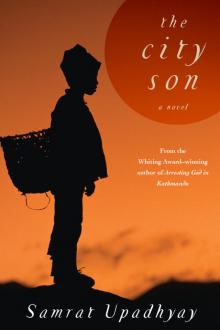- Home
- Samrat Upadhyay
The City Son Page 4
The City Son Read online
Page 4
Mahesh Uncle has never married, which is another reason that people say he has designs on Apsara. They say that after all these years of living alone he has begun to yearn for companionship. Those who are envious of his wealth and contemptuous of Apsara say that he has found himself a gold digger. Those who are sympathetic toward her say that he wants to take undue advantage of a fallen woman. Those who like both of them think that it’s mutually beneficial: she’s saddled with a young son and needs a guardian, and he needs a female companion for old age.
The large glass doors in the living room that Mahesh Uncle refers to as “French windows” open to a sumptuous garden enclosed within high walls. No noise from the street encroaches; the walls also prevent obtrusive neighbors from peeking in and coming to conclusions about your inner life. There’s a fountain against one of the walls. Water gurgles from Lord Shiva’s mouth and flows down in meandering rivulets, as if he’s spitting out River Ganga herself. The water enters and exits other statues—Fat Buddha, Ganesh, Meditative Buddha, an owl, a dalmatian dog, a frog—moving in and out of their bodies, forming small pools where lotus flowers float. Mahesh Uncle says he designed the fountain himself, and one of his foreigner friends built it. When it was first built, Mahesh Uncle came here often, but now he’s so busy with his work and his travels that when he comes home all he wants to do is take off his shoes and sit on the sofa with his legs pulled up and his newspaper on his lap. “Maybe you can take over this fountain, Tarun, and this garden,” he says. He calls his garden a Japanese garden, and at first Tarun thinks he calls it Japanese because the builder, his friend, is from Japan. Then Mahesh Uncle explains that the garden is built in the Japanese style, with the fountain and the rocks placed in certain ways; although with the dalmatian and the Ganesh, the garden, he jokes, is more international than Japanese. His hand on Tarun’s shoulder, he asks whether Tarun would like to be in charge of the garden, since Mahesh Uncle is getting old and needs someone responsible to make sure it works properly. Tarun nods shyly. “But, Tarun, how will you be the manager of this garden when you live in Kupondole? You’ll have to travel here every day, maybe even twice a day, in order to water the plants and to make sure that the fountain flows well. I do have a gardener, but”—he lowers his voice to a whisper—“he’s not reliable, and I need someone trustworthy to keep an eye on him. But how will you do it if you continue to live in Kupondole?” He addresses Apsara: “Why don’t we make it simple and have you and Tarun move here? There are two rooms upstairs, sitting empty like unemployed workers. Our Tarun can have a separate room if he wants. And you can take that room”—he points to the window that overlooks the garden—“with a view of the garden. Sanmaya will take care of everything, the cooking, the laundry. Where’s the harm in this?”
Apsara blushes red, as though Mahesh Uncle has made a marriage proposal. “We’ll be a burden,” she says. Her arms are crossed at her chest. She has half-heartedly combed her hair but she hasn’t tied it properly because the wind is blowing it all over her face.
“What burden?” Mahesh Uncle says.
“I can’t do it,” she says.
Then Sanmaya comes into the garden to call them for dinner. She has wrinkled, pleated skin and teeth missing. But she has a big smile and bright eyes, and anyone Mahesh Uncle likes she likes, and anyone Mahesh Uncle dislikes she dislikes.
“Dukh paryo timiharulai,” she says inside when Mahesh Uncle is out of earshot. Apsara doesn’t like words of pity and commiseration. But it’s this very pride that makes her feel worse. She doesn’t break down and cry. Tarun wishes she’d cry with Sanmaya when the old servant offers sympathy. He wishes his mother would admit that yes, we are suffering, I am suffering, and as a consequence my boy is suffering. He wishes she’d cry on Mahesh Uncle’s wide shoulders, let him comfort her, perhaps even kiss her.
Mahesh Uncle is on the phone upstairs, so Sanmaya talks: “He thinks the world of you. I have never heard him speak as fondly about anyone as you two. He has been so alone for so long—it’s really good to see him feel connected like this. People say about him, ‘Oh, he is such a wealthy man living such a high life,’ but these people are murkhas. What do they know about him? I have seen him in his loneliest state. I came to work for him when I was much younger, about twenty years ago. Did you know that he was already a successful businessman then? He is one of the most hardworking men I know. There is something in him, a drive, that most people don’t have. Only very important people, like prime ministers and presidents, have that kind of drive.
“He started from scratch. He came to this city as a young boy, and at first he sold newspapers, then as he put himself through college he opened up a restaurant in Ranipokhari, when he was twenty. Twenty! The rest is history. Do you know that the finance minister has come to this house for dinner? And we’ve had parties where the who’s who of this city have come. But he’s never let his success go to his head. As big a man as he is, his heart is even bigger. Do you know how many struggling and suffering people he has helped? It will take me all day to count them. Yet he never asks anything in return, doesn’t expect anything back. He doesn’t even tell me when he has helped these people. I hear it from them, and they can’t stop from singing his praises. I can tell you that when he wants you to come and live here, he has no ulterior motives. I know people are saying this and that, casting aspersions on his intentions, but I challenge these murkhaharu and bekammaharu to find me someone with a purer heart. I challenge them! In fact, I say that instead of talking behind his back, if they come and touch his feet, then the darkness in their own hearts will begin to evaporate.”
Sanmaya goes on and on, but Tarun doesn’t mind because he likes her leathery face and how the skin around her eyes turns into multiple folds when she smiles. Even when she’s complaining and calling people murkha, her face is soft and open. Most important, she doesn’t expect you to give her your undivided attention when she talks. She continues her monologue even when you’re watching the birds in the garden or if you’re staring at a painting or if you ask for a glass of water. So when Mahesh Uncle is on the phone, Sanmaya keeps on about what a great man he is, and Apsara, her gaze on the floor, is only half listening.
Tarun wonders if he is betraying her when he enjoys Didi’s affection. His mother rarely asks about Tarun’s Saturday visits to Bangemudha, but when Sanmaya briefly leaves the room, she asks him, “So what does the Masterji have to say when you visit? Anything?” She then asks about Amit and Sumit, trying to hide the bitterness in her voice, as though she really likes Didi’s sons. Tarun tells her that they are fine and that he plays with them. He brings a neutral inflection into his voice, pretending that his playing with Amit and Sumit is the most natural thing in the world. His mother doesn’t ask Tarun about Didi, but she says, “So you must have eaten delicious snacks in that house,” and Tarun tells her, as indifferently as he can, “It was all right.”
Tarun thinks how nice it would be if Didi also lived with them here. He imagines he and Didi sleeping in the same room upstairs, with Mahesh Uncle in the room that faces the main gate and his mother in the room from where she can view the fountain. But he knows this is foolish. Mahesh Uncle has gotten off the phone and entered the dining room now, and Sanmaya is serving the food on fine china plates and with polished cutlery.
Sanmaya is not as good a cook as Didi, but Tarun doesn’t mind because he’s enjoying the newness and the opulence of Mahesh Uncle’s house: the chandeliers hanging from the ceiling, the lemon water in small bowls to dip their fingers in after they finish eating, Mahesh Uncle lighting his cigar. On the way back home in Mahesh Uncle’s car, as they pass the Ratna Park area, Tarun glances toward the direction of Bangemudha. He thinks of Didi’s malpua, and suddenly his mouth waters.
CHAPTER EIGHT
ONE EVENING APSARA doesn’t come home. Tarun thinks that she has been delayed at work, although as the evening progresses this idea doesn’t sound plausible, given that often she doesn’t go to work in the first place. At
ten o’clock, a neighbor knocks, asking for his mother. “She’s working late today,” Tarun tells her. The neighbor looks at him skeptically, then asks him whether he wants to wait for his mother in her flat instead of sitting here by himself. “I have homework to do,” Tarun says.
All night long he waits in the dark. He thinks she is dead. Night noises come from surrounding houses and flats. An old woman coughs violently every hour or so. A baby mewls. He hears a rustle outside his door. It’s not his mother’s footsteps; he can tell. He pictures a rotund man with a snarling face, waiting for him to open the door. Tarun cries out for Didi, silently, and the rustling stops, only to start again some time later.
As soon as there’s a tinge of light in the sky, he goes looking for his mother. After about an hour, he finds her asleep in a pavilion by the Bagmati shore. Her head is on the lap of a saffron-robed sadhu, whose eyes shine fiercely. Upon seeing Tarun, the sadhu puts his finger to his lips and says, “Shhh!”
“That’s my mother,” Tarun says, but he’s scared of the sadhu’s unruly beard and his gleaming eyes. The man’s long, blackened fingers stroke her forehead and smooth her wrinkles. Tarun leaves the pavilion, bewildered about what he should do. He wanders along the Bagmati shore, hoping he won’t run into one of his river friends—they live somewhere around here, don’t they? He considers going to Bangemudha and telling Didi and his father about what has happened, but he doesn’t want to cast his mother in any more of a negative light. Then he is in the Tripureswor area, and as the streets become filled with the hazy morning light, he finds a store with a phone and calls Mahesh Uncle, who has to be roused from his sleep. He tells the boy to stay where he is, and in about half an hour he arrives, driving his car.
She has already left the sadhu’s side, and Tarun and Mahesh Uncle go to the flat, where she’s sitting by the window, whimpering, calling out Tarun’s name. “Kahan harayeko, Apsara?” Mahesh Uncle asks. “The boy has been worried sick.” But her tear-streaked face is fixed on Tarun, and she continues to mumble his name. She looks like a street crazy who curses invisible people. Mahesh Uncle asks the boy to pack everything, and he, too, stuffs clothes and knickknacks into empty suitcases and bags, while Apsara watches. Mahesh Uncle says, “I’ll send the driver later to pick up the rest of your belongings.” When Mahesh Uncle asks her to stand, she refuses, saying she’s not going anywhere. Mahesh Uncle crouches in front of her and uses a velvety voice to fakau fulau her, telling her that it’s a temporary solution meant more for Tarun than for her. The boy shouldn’t have to go through what he went through seeing her in the pavilion with the sadhu, Mahesh Uncle tells her. Her eyes open wide in shame; she hadn’t known until then that Tarun had seen her on the sadhu’s lap. She covers her face with her palm.
The Masterji is not happy about the move. “Who is this man?” he asks. He has known about Mahesh Uncle for a while now, how he is fond of Tarun and Apsara. A separate room for each of them? Yes, Tarun has a room to himself, with a proper bed, not bedding spread on the floor. There’s a bedside table on which Sanmaya puts a jug of water in case he gets thirsty during the night. Before he sleeps she brings him a warm glass of milk to drink and sits with him with that toothless smile of hers as he holds the glass with both palms and drinks. She leaves only after the boy has finished the milk and handed the glass to her. “Ramrari sutnu, la?” she says as she shuts the door behind her.
Next door is Mahesh Uncle, and Tarun can hear him on the phone. Words such as “commission,” “contract,” and “discount” and “percent” have become familiar to Tarun by now because Mahesh Uncle uses them quite a bit. Just hearing his voice makes Tarun feel good.
Mahesh Uncle’s intentions are not good, the Masterji is implying, but he’s looking at Didi to judge whether she approves of what he’s just said so he can carry his thoughts further and end them in some type of action, something like marching over to Lazimpat and wrenching the boy away from Mahesh Uncle. But Didi doesn’t engage her husband; she gets up and walks into the kitchen. Sumit is busy smiling into a comic book. Amit is in the corner watching Tarun and Didi. These days he watches the two quite a bit. Tarun follows Didi into the kitchen. She doesn’t turn to him, but her voice is pleasing enough when she asks him, “And what would my son like to eat?”
“French toast,” he says. He wishes she’d turn to him and embrace him. But she is busy rinsing dishes at the sink. “Pauroti ta chha tara anda chaina. Amit, run to the store and bring an egg for your brother.”
Amit doesn’t move. Didi raises her voice. “Didn’t you hear? I need an egg to make French toast for your brother.” She says frentos in her village woman’s pronunciation. She learned how to make it after she came to know that Apsara made it regularly for him. Didi’s French toast is thicker, more succulent than his mother’s.
Amit stands and leans against the wall, his arms crossed. “Why only for him? Why not Sumit and me also?”
“Didn’t you and Sumit have a boiled egg each this morning? And now your brother, who visits once a week, wants some French toast, you get huffy?”
“But we only had a boiled egg, not French toast. We’d also like French toast. We’re also hungry.”
“Okay, I can’t win with you. Get three eggs then.”
Amit mutters and leaves. Didi turns to Tarun and says, “Now that you’ve moved to a big man’s house, you’re going to forget about us all, aren’t you? You’re going to forget about me.”
He moves to her and embraces her. In her left hand she has a towel and in her right a plate, and she doesn’t put them down, like she usually does, so she can hug him. His face is buried in her stomach; he’s trying not to show that he’s teary eyed. He looks up to see that the Masterji is watching them and that Sumit is happy with something he sees in his comic book. Tarun feels a dark twisting inside his stomach: Didi is withholding her affection. She is not going to hug or embrace him nor acknowledge his tears. He’s on his own now. Amit enters with the eggs in his hands, and upon seeing Tarun with his arms around his mother, he rolls his eyes in exasperation. “One minute I’m away,” he says. He makes the gesture of hurling the eggs toward them, one by one. Didi doesn’t see him, but the Masterji does, and Tarun observes him shaking his head at Amit.
Didi serves French toast to the three boys, but she is grim, and Tarun anxiously searches her face to see if she’ll smile at him, ruffle his hair, caress him, call him “my son” in a voice meant only for him, a voice that emerges from the depths of her throat and enters his ears, then goes down and vibrates in his belly, where it stays, warm and alive, for days. Without it today his stomach is already hollow. The French toast tastes dry and leathery. After several unpleasant bites, he says, “Bathroom janu paryo,” and he runs to the toilet. He retches. As he sits on his haunches on the toilet, small globules of blood drip down from his anus and scatter on the porcelain. He grunts, tears falling, and after a few more drops the bleeding stops. I’ll go to her and tell her about the blood, he thinks, but then he pictures her face, the eyes that are impassive, unresponsive, and he knows that if she doesn’t show concern he won’t be able to take it. So after he washes himself and gets out of the bathroom, he heads straight for the door.
“Kahaan jaana la?” his father asks.
“I’m not feeling well. I’m going to go home.”
“Your new home, da?” Sumit asks. “When are you going to invite us?”
Amit punches him on the shoulder.
Didi is watching him, but she’s not smiling.
“What about your French toast?” the Masterji asks.
“My stomach is hurting.”
He wants Didi to come to him, ask him solicitously where it hurts, then take him to bed and gently knead his stomach. But she doesn’t.
CHAPTER NINE
TARUN CAN’T SLEEP. The newness of Mahesh Uncle’s house, which excited him at first, now makes him feel like a stranger. His mother is next door, with her rustling and her mumbling. There are days when she sleeps all afternoon and i
s up throughout the night. One night he awakens and goes downstairs, where he finds her in the living room, lying on the floor with her arms and legs stretched out. The death pose, she says. Shavasana. She asks him to lie down with her. Another night she comes to his room just as he is about to sleep and strokes his forehead and asks him how things are at school. Before he can answer, she begins talking about a picnic she went on when she was a young girl.
He is used to her erratic ways by now, and he has come to accept that this is his lot. At school sometimes a new friend will ask him, “So, is it true that your mother has lost her mind?” and he answers tactfully, “She has a problem or two.” He’s calm about his mother, which makes his friends calm about him and his mother. His friends flock around him—he is well loved. Tarun also gets good report cards. He’s the type that the teachers call on, for he provides cogent, well-considered answers. The teachers also like the calmness he exudes. “Tarun, gharma saab thik chha?” they ask, putting their arms around him. “Your mother is fine?”
But now Tarun is so troubled by Didi’s withholding of affection that he can’t pay attention in school. When the teachers call on him, he gropes for answers. Two of his friends ask him whether things are all right with his mother—it doesn’t occur to them that things might not be all right with his stepmother. They all know that every Saturday he goes to Bangemudha to spend time with his father and his village family. They know that the older of the stepbrothers is a bully. They know that the stepmother loves Tarun.
One day after school he gets off the bus at Ranipokhari instead of Lazimpat. He walks into Asan and moves through the lanes that surround the Bangemudha house, hoping he won’t bump into Amit or Sumit, either of whom could be nearby running errands or hanging out with friends. They are sure to ask him what he’s doing in Bangemudha on a school day. Amit is sure to jab him on the shoulder and say, “What’s up with you? Ta muji randiko chhorako yahaan yetibela ke kaam? Isn’t it enough that you show us your ugly face once a week?” And he might even kick Tarun, and what answer will Tarun give? That he is here to check on Didi to see if she is still unhappy with him? Tarun will laugh his head off then, call him a namby-pamby.

 Arresting God in Kathmandu
Arresting God in Kathmandu Mad Country
Mad Country The Guru of Love
The Guru of Love The City Son
The City Son